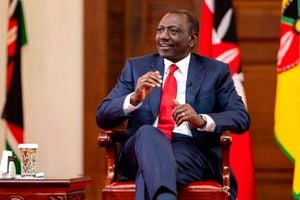
Raila Odinga during the 10th Memorial Anniversary for Mama Rosah Oyoo, the mother to Ida Odinga, in Migori County.
Opposition leader Raila Odinga has rightfully earned his stripes. He has been one of Kenya’s longest serving political prisoners, incarcerated without trial on numerous occasions by the one-party dictatorship he valiantly fought to remove.
Many of the freedoms we enjoy today, including a robust democracy and constitutional protections for freedom of expression, media, association and other basic human rights are the direct result of the struggle and sacrifice of Mr Odinga and his comrades in the fight against dictatorship.
His place in the annals of Kenyan history is written in stone and will never be erased. However, Mr Odinga stands, in his twilight years, to destroy a well-deserved legacy by just thinking of getting into bed with President William Ruto.
He has advanced the nonsensical argument that any such moves would be in the interest of pulling Kenya from the precipice, but everything points to a bid for a seat in the Kenya Kwanza regime’s feeding trough.
To his credit, Mr Odinga, under relentless public pressure, has stepped back from his stated intention to engage a in dialogue driven and controlled by State House; to the exclusion of the youthful Gen Z protesters whose revolt presented President Ruto with the biggest challenge to his young government.
It is clear that the talks President Ruto has offered to convene are not the national conversation demanded around disastrous economic policies, abuse of power, runaway corruption, human rights abuses and creeping regression to dictatorship.
A regime that is in the dock cannot be the trusted arbiter in any conversation. For talks to be meaningful, they must be under a forum that is acceptable to all stakeholders, not one controlled by a regime in self-preservation mode and intent on rigging participation to ensure the microphone is monopolised by the usual sycophants.
By setting new conditions for his participation in any dialogue, Mr Odinga has ensured that President Ruto cannot yet move on his own and unilaterally launch a dialogue packed with his choir of praise singers.
However, chances are that it was more than that for Mr Odinga; it was more of a tactical retreat rather than a genuine commitment to not lend his name to a scheme designed to help save President Ruto from the wrath of citizens.
It is instructive that even as Mr Odinga steps back from immediate talks, his surrogates in the ODM party have taken to political platforms all over the place defending the proposed engagement with government.
They are also rubbishing the historic achievements of the youth revolution, and hurling angry broadside at their Azimio la Umoja One Kenya Coalition partners — notably Kalonzo Musyoka of Wiper, Martha Karua of Narc, Jeremiah Kioni of Jubilee Party and Eugene Wamalwa of DAP-K — who have refused to be led by the nose.
It is most likely that sooner or later Mr Odinga will go into the proposed talks, where the desired outcome will not be solutions to national grievances, but his incorporation into the gravy train of a “broad-based” government frequently mooted by President Ruto.
It is a shame that Mr Odinga is even contemplating such an arrangement during a period when the government is threatening to crack down even more brutally on protests.
Secret police squads operating outside the confines of the law are still actively abducting real and imagined government critics and subjecting them to the third degree in vain attempts to link financing and organisation of the revolt to political opponents or foreign agencies
The government, in tones reminiscent of the Moi dictatorship, has come up with a list of groups which it ridiculously says are financed by the US-based Ford Foundation to overthrow the government. We can expect in coming days a fierce crackdown on civil society, media and other independent institutions that have traditionally played watchdog roles.
The government is also threatening, in utter contempt of constitutional guarantees, to muzzle media coverage of dissenting voices, including the protests. It is also leading massive cover-ups on incidents of police brutality recorded during suppression of the protests, including a large number of killings that can only fall under the description of extra-judicial executions.
President Ruto disbanded his Cabinet in response to the protests, acknowledging that the government had failed due to ineptitude and corruption within the ranks, but then brought back a majority of the same old discredited ministers in the “half-cabinet” unveiled last week.
The remaining positions are the rotten carrots dangled in front of Mr Odinga, whose seems keen to plunge head-first in the murk. He must reconsider his stance before an illustrious legacy comes to an ignominious end.
[email protected]; @MachariaGaitho







